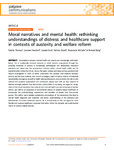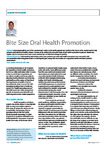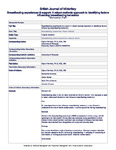Moral narratives and mental health: rethinking understandings of distress and healthcare support in contexts of austerity and welfare reform
| dc.contributor.author | Thomas, F | |
| dc.contributor.author | Hansford, L | |
| dc.contributor.author | Ford, J | |
| dc.contributor.author | Wyatt, K | |
| dc.contributor.author | McCabe, R | |
| dc.contributor.author | Byng, Richard | |
| dc.date.accessioned | 2021-10-19T11:08:28Z | |
| dc.date.available | 2021-10-19T11:08:28Z | |
| dc.date.issued | 2018-04-10 | |
| dc.identifier.issn | 2055-1045 | |
| dc.identifier.issn | 2055-1045 | |
| dc.identifier.other | 39 | |
| dc.identifier.uri | http://hdl.handle.net/10026.1/18108 | |
| dc.description.abstract |
Objective This systematic review aimed to assess the effectiveness, feasibility and acceptability of mobile health (mHealth) technology (including wearable activity monitors and smartphone applications) for promoting physical activity (PA) and reducing sedentary behaviour (SB) in workplace settings. Methods Systematic searches were conducted in seven electronic databases (MEDLINE, SPORTDiscus, Scopus, EMBASE, PsycINFO, Web of Science and the Cochrane library). Studies were included if mHealth was a major intervention component, PA/SB was a primary outcome, and participants were recruited and/or the intervention was delivered in the workplace. Study quality was assessed using the Effective Public Health Practice Project (EPHPP) tool. Interventions were coded for behaviour change techniques (BCTs) using the Coventry, Aberdeen and London – Refined (CALO-RE) taxonomy. Results Twenty-five experimental and quasi-experimental studies were included. Studies were highly heterogeneous and only one was rated as ‘strong’ methodological quality. Common BCTs included self-monitoring, feedback, goal-setting and social comparison. A total of 14/25 (56%) studies reported a significant increase in PA, and 4/10 (40%) reported a significant reduction in sedentary time; 11/16 (69%) studies reported a significant impact on secondary outcomes including reductions in weight, systolic blood pressure and total cholesterol. While overall acceptability was high, a large decline in technology use and engagement was observed over time. Conclusions While methodological quality was generally weak, there is reasonable evidence for mHealth in a workplace context as a feasible, acceptable and effective tool to promote PA. The impact in the longer term and on SB is less clear. Higher quality, mixed methods studies are needed to explore the reasons for decline in engagement with time and the longer-term potential of mHealth in workplace interventions. Protocol registration: The review protocol was registered with PROSPERO: CRD42017058856 | |
| dc.format.extent | 39- | |
| dc.language | en | |
| dc.language.iso | en | |
| dc.publisher | Palgrave Macmillan (part of Springer Nature) | |
| dc.subject | Behavioral and Social Science | |
| dc.subject | Basic Behavioral and Social Science | |
| dc.subject | Mental Health | |
| dc.subject | Health Services | |
| dc.subject | Clinical Research | |
| dc.subject | Mental health | |
| dc.subject | Generic health relevance | |
| dc.subject | 1 No Poverty | |
| dc.title | Moral narratives and mental health: rethinking understandings of distress and healthcare support in contexts of austerity and welfare reform | |
| dc.type | journal-article | |
| dc.type | Journal Article | |
| plymouth.issue | 1 | |
| plymouth.volume | 4 | |
| plymouth.publication-status | Published online | |
| plymouth.journal | Palgrave Communications | |
| dc.identifier.doi | 10.1057/s41599-018-0091-y | |
| plymouth.organisational-group | /Plymouth | |
| plymouth.organisational-group | /Plymouth/Faculty of Health | |
| plymouth.organisational-group | /Plymouth/Faculty of Health/Peninsula Medical School | |
| plymouth.organisational-group | /Plymouth/REF 2021 Researchers by UoA | |
| plymouth.organisational-group | /Plymouth/REF 2021 Researchers by UoA/UoA03 Allied Health Professions, Dentistry, Nursing and Pharmacy | |
| plymouth.organisational-group | /Plymouth/Research Groups | |
| plymouth.organisational-group | /Plymouth/Research Groups/FoH - Community and Primary Care | |
| plymouth.organisational-group | /Plymouth/Research Groups/Institute of Health and Community | |
| plymouth.organisational-group | /Plymouth/Research Groups/Institute of Translational and Stratified Medicine (ITSMED) | |
| plymouth.organisational-group | /Plymouth/Research Groups/Institute of Translational and Stratified Medicine (ITSMED)/CCT&PS | |
| plymouth.organisational-group | /Plymouth/Research Groups/Plymouth Institute of Health and Care Research (PIHR) | |
| plymouth.organisational-group | /Plymouth/Users by role | |
| plymouth.organisational-group | /Plymouth/Users by role/Academics | |
| dcterms.dateAccepted | 2018-03-13 | |
| dc.rights.embargodate | 2021-10-20 | |
| dc.identifier.eissn | 2055-1045 | |
| dc.rights.embargoperiod | Not known | |
| rioxxterms.funder | Economic and Social Research Council | |
| rioxxterms.identifier.project | Poverty, pathology and pills: moral narratives and the medicalisation of distress | |
| rioxxterms.versionofrecord | 10.1057/s41599-018-0091-y | |
| rioxxterms.licenseref.uri | http://www.rioxx.net/licenses/all-rights-reserved | |
| rioxxterms.licenseref.startdate | 2018-04-10 | |
| rioxxterms.type | Journal Article/Review | |
| plymouth.funder | Poverty, pathology and pills: moral narratives and the medicalisation of distress::Economic and Social Research Council |




